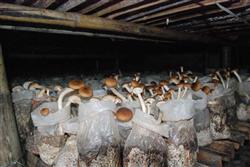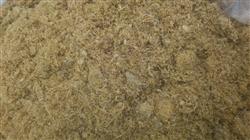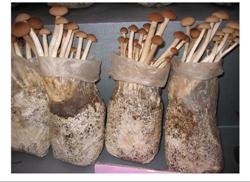Tea mushroom cultivation: how to grow tea mushroom?

How to grow tea mushrooms? There are no netizens to help introduce the planting method of Pleurotus ostreatus, the farming network is sorted out below for the majority of netizens' reference. 1. The cultivation environment of Pleurotus ostreatus: the mycelial growth temperature of Pleurotus ostreatus is 3-35 ℃, and the optimum growth temperature is 23-28 ℃. When the temperature was above 30 ℃, the mycelium growth decreased or even stopped. The differentiation and development temperature of fruiting body was 23 ~ 26 ℃, and the optimum temperature was 18 ~ 24 ℃. Higher or lower temperature would delay primordium differentiation. According to the experiment, the best temperature was about 20 ℃, which was about 10 days from budding to ripening. When Pleurotus ostreatus is in the mycelial growth stage, the suitable water content of the culture material is 60%-65%. The air relative humidity during mycelium growth should be 65% and 70%. Light is not needed in the stage of mycelium growth, and excessive bright scattered light can inhibit the growth of mycelium. Pleurotus ostreatus is an aerobic bacteria and is very sensitive to CO2. Poor ventilation, high CO2 content, slender stalk, hindered cap development, easy to open umbrella or cause deformity. The mycelium could grow in the range of pH 4-7, and the best pH value was 4.5-5.5. The mycelium grew poorly when the pH value was lower than 4 or higher than 7. 2. Preparation of Pleurotus ostreatus before planting, there are some cultivation modes, such as indoor shelf bag, off-bag covering soil, bacterial wall bag planting and so on. Spring planting is generally inoculated in bags from late February to early March, and mushrooms are produced in April-May; in autumn, bags are inoculated at the end of August and early September, and mushrooms are produced from October to November. Tea mushroom bag cultivation usually produces mushrooms in the room (shed). Choose the place with high terrain, sunny ventilation, convenient transportation, near water source and no pollution to build a simple mushroom house, and the brick structure is the best. Bed frames can be set up in mushroom houses or mushroom sheds. Fengxian general culture material formula is mixed sawdust 40%, cottonseed hull 30%, wheat bran 16%, corn (2345, 12.00,0.51%) meal 8%, rapeseed (5145, 62.00,1.22%) cake powder 4%, gypsum 1%, white sugar (5207,-9.00,-0.17%) 0.5%, potassium dihydrogen phosphate 0.4%, magnesium sulfate 0.1%. 3, tea salary mushroom bag production according to the conventional weighing ingredients The water content is about 60%, the ratio of material to water is about 1.0 ∶ 1.2, and the pH value before sterilization is about 7. Bag in time after the moisture permeates evenly. Horizontal bag cultivation is usually filled with low-pressure polyethylene tube film bags of 15.00 cm × 55.00 cm × 0.04 cm, each containing 700g dry material. The specific operation of high-temperature sterilization is as follows: open the air valve to heat, when the pressure rises to 0.8-1.1 kg/cm2 and the gas discharged reaches 107 ℃, control 2-3 h to ensure that the heat in the pot has enough time to penetrate the material bag, and then heat it up after the same temperature inside and outside the bag, so that the pressure rises to 1.5-1.7 kg/cm2 and keeps 105-120 min. When the fire starts, the fire attacks. The central temperature in the bag should reach 97-100 ℃ 2 h after ignition, and then maintain 15-18 h [1-2]. No cease-fire, no cooling, no fire, 100 ℃. The hyphae of the original and cultivated species were strong and white, and were inoculated at both ends of the bag when the feed temperature was cooled to 28 ℃. Drilling and inoculation can also be carried out simultaneously after sterilization. After inoculation, the inoculation hole was sealed with transparent tape. Each bottle of bacteria can be inoculated with 25 bags. 4. The management of the outbreak period of Pleurotus ostreatus: in the first 3 days after inoculation, the room temperature was adjusted to 25-27 ℃ to make the mycelium grow healthily. When the mycelium grows to 1ap2, its growth begins to slow down, then loosen the bag opening rope, or puncture 1 to 2 rows of micropores to increase oxygen within 1.0-1.5 cm in front of the mycelium growth. The relative humidity of indoor air in the germicidal stage should be controlled at about 70%. And do not have too bright light, doors and windows should be shaded. 5. Budding management of Pleurotus ostreatus: the method of arranging bags in outdoor mushroom shed is as follows: the field is arranged into a border bed with a width of 30 cm and a height of 15 cm, the bed is covered with one layer of sand, then two layers of film are spread, and the bags at both ends of the bag are cut open and piled on the bed. The direction of the bacterial bags should be consistent with the direction of the doors and windows of the mushroom shed. Bag cutting and bag arrangement are carried out at the same time. Before opening the bacterial bag, disinfect the bacterial bag and disinfect the site with 34% carbonic acid or 3 000 times of deltamethrin and 2 000 times of dimethoate. Use a sharp knife to cut off the bag film along the piercing rope. After cutting the bag, with the extension of the browning time and the deepening of the color of the mycelium, a layer of brown skin will be formed on the surface around the mouth of the bag. The skin with normal color conversion is brown and rusty brown with luster and normal mushroom production. Combined with the discoloration of the bacterial bag, the temperature difference was enlarged continuously for 3 to 7 days, and the temperature difference between day and night reached 8: 10 ℃, until many white particles appeared and differentiated into mushroom buds. 6. The management of Pleurotus ostreatus after emergence: during the period of mushroom emergence, the temperature of the greenhouse was kept at 15: 26 ℃, and the best temperature was 20: 24 ℃. After the primordium is formed, it is necessary to increase the number of water spraying to keep the air relative humidity at 85%-90%. In the early stage, it mainly sprays water to the space and the ground, and in the middle and later stage, it can spray water directly to the fruiting body. During the fruiting body growth, the respiration is exuberant. During the mushroom production period, the ventilation of the mushroom shed should be increased to keep the air fresh. The illuminance of mushroom production time should be kept at 500-1000 lx. Do not move the bacterial bag at will during the growth period, and do not disturb the light source of the mushroom shed. Pleurotus ostreatus can pick 3-4 tide mushrooms in succession. Every time after picking 1 tide mushroom, cover the bag with plastic film (11290,-105.00,-0.92%), stop water for 7 days, keep the air relative humidity 70%-75%, and then accelerate the bud according to the above method after the wound is healed. 7. Harvesting and preservation of Pleurotus ostreatus: when the color of the cover changes from dark reddish brown to light flesh, and the bacterial film has not yet broken, it is the right time for harvest. When harvesting, it is required to pick the whole cluster or a single plant at one time, and then cut the mushroom feet. Air-dry the fresh mushrooms in an air-conditioned room of 15: 20 ℃ to 80% dry, then pack them in plastic bags or styrofoam boxes, cover them with 4-6 layers of absorbent toilet paper at the mouth of the bags or boxes, seal and refrigerate, and keep them at 5: 10 ℃. In the process of transportation, press the mushroom body properly to prevent vibration in the packaging container. Click to get more tea mushroom planting technology click to get more edible mushroom planting technology
- Prev

Tea tree mushroom cultivation: tea tree mushroom ingredients to pay attention to what?
What should I pay attention to when making tea mushroom ingredients? Hope some netizens can guide the tea tree mushroom formula easy to occur ingredients do not meet the standard factors: tea tree mushroom bioconversion rate can achieve 133%, that is, feed (dry material)100 kg, can produce fresh mushroom 133 kg. Although there are many factors, one of the most important ones is the cultivation of...
- Next

Cultivation of Pleurotus ostreatus: what conditions will affect the yield of Pleurotus ostreatus?
What conditions will affect the yield of Pleurotus ostreatus? Please explain that there are four main factors that will lead to the reduction of Pleurotus ostreatus production: first, strain degradation: the breeding work of Pleurotus ostreatus lags behind, the source of strain is single, and there is obvious degradation. Second, the formula is unreasonable: the formula of culture material in the production of tea mushroom.
Related
- Fuxing push coffee new agricultural production and marketing class: lack of small-scale processing plants
- Jujube rice field leisure farm deep ploughing Yilan for five years to create a space for organic food and play
- Nongyu Farm-A trial of organic papaya for brave women with advanced technology
- Four points for attention in the prevention and control of diseases and insect pests of edible fungi
- How to add nutrient solution to Edible Fungi
- Is there any good way to control edible fungus mites?
- Open Inoculation Technology of Edible Fungi
- Is there any clever way to use fertilizer for edible fungus in winter?
- What agents are used to kill the pathogens of edible fungi in the mushroom shed?
- Rapid drying of Edible Fungi

